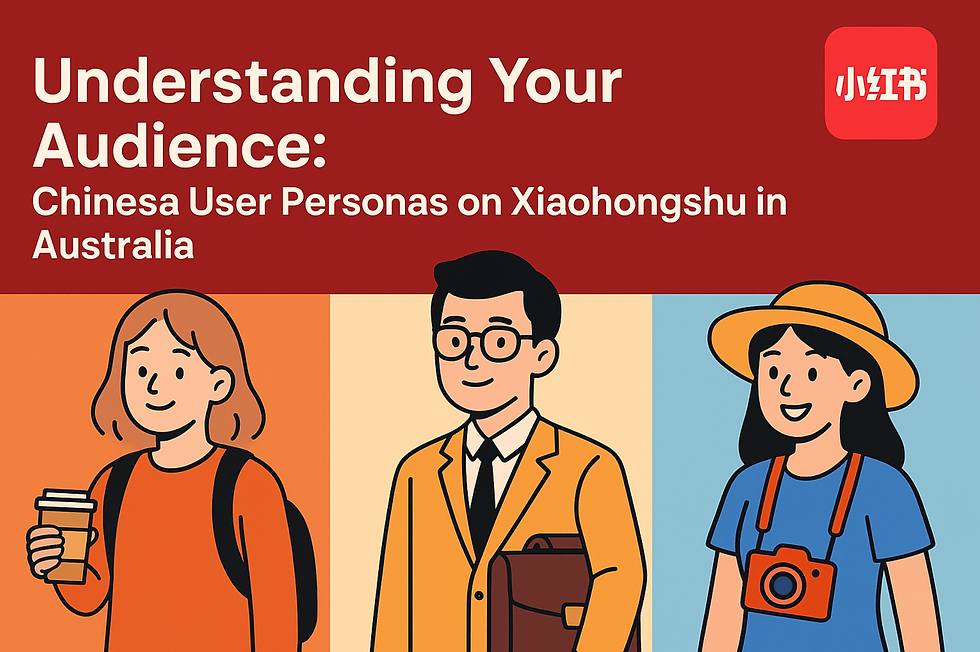Part 10 – Unlocking Xiaohongshu’s Algorithm: How to Maximise Visibilityand Growth in Australia
- Jia HE
- Oct 17
- 3 min read
Updated: Oct 21

For many Australian businesses, posting on Xiaohongshu (RedNote) feels like
throwing content into a black hole. Some posts take off, others barely get seen —
why? The answer lies in understanding how Xiaohongshu’s algorithm works.
If you want to reach Chinese-speaking consumers in Sydney, Melbourne, or Brisbane,
it’s not just about what you post — it’s about how the platform decides to
recommend your content. In this article, we’ll break down the key factors behind
Xiaohongshu’s algorithm and how you can use them to maximise visibility and
engagement.
Why the Algorithm Matters
Unlike Instagram or Facebook, Xiaohongshu is not purely social. It’s a hybrid of
search engine + recommendation system + community platform. That means:
● The right keywords can help people discover your brand when they search.
● Strong engagement signals push your content into larger “traffic pools.”
● Building trust with authentic interactions increases long-term reach.
Mastering these elements can turn Xiaohongshu into a steady growth engine for
your business in Australia.
Four Key Algorithm Signals You Need to Know
1.Engagement Weighting
● Not all interactions are equal.
● Shares, saves, and comments are more valuable than likes.
● The more “deep interactions” your post gets, the more likely it is to be pushed
to new users.
2.Watch Time & Completion Rate
● The algorithm rewards posts that keep users watching or scrolling until the
end.
● A 15–30 second short video that hooks viewers in the first 3 seconds will
perform far better than a static post with low retention.
3.Keywords & Search Optimisation
● Users often treat Xiaohongshu like Google.
● Adding relevant location + lifestyle keywords (e.g., “Sydney Yum Cha”,
“Melbourne property investment”, “Brisbane childcare centre”) ensures you
appear in search results.
4.Cold Start Testing
● Every new post is shown to a small test audience.
● If engagement is strong within the first 1–2 hours, the platform expands
distribution.
● That’s why replying to comments quickly and encouraging interaction early is
critical.
Practical Tips to Maximise Visibility
● Craft Search-Friendly Titles
Example: “Top 5 Sydney Cafés Loved by International Students” instead of “Best
Cafés in Sydney.”
● Hook in the First 3 Seconds
Start videos with a question, strong statement, or eye-catching scene.
● Use Localised Hashtags
● Engage Actively
Respond to every comment within the first 24 hours. Show users there’s a real
person behind the brand.
● Leverage Seasonal Trends
Time posts around Chinese New Year, Mid-Autumn Festival, or university
orientation weeks for international students.
Why This Matters for Australian Businesses
For local brands, understanding the algorithm means:
● Your posts don’t get lost in the noise.
● You connect with highly targeted, high-intent Chinese audiences.
● You build sustainable growth, rather than relying on one-off viral posts.
In short: algorithm knowledge = marketing advantage.How EzyMarketing Helps You Win the Algorithm Game
At EzyMarketing, we combine data-driven insights with local expertise to help your
brand thrive on Xiaohongshu:
● Custom keyword libraries for Chinese-Australian audiences.
● Content calendars optimised for seasonal and cultural moments.
● Engagement strategies to trigger second-wave recommendations.
● Analytics tracking to refine and double down on what works.
We don’t just post for you — we make sure every post has the best chance to grow.
The Xiaohongshu algorithm is not a mystery — it’s a system that rewards
authenticity, engagement, and relevance. By understanding how it works and
applying smart strategies, your brand can achieve real, lasting growth in the
Chinese-Australian market.
Want to unlock your Xiaohongshu growth potential?
📩 Contact us today for a free consultation.
Or book now: https://calendly.com/hejia77/30min_with_jia
M: 0433718945




Comments